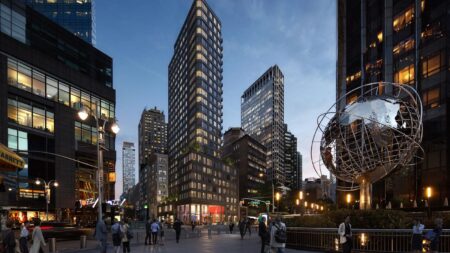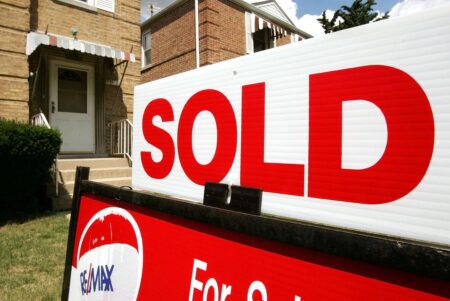Despite a lack of affordable housing, many American cities have seen a paradoxical proliferation of new luxury condos. The reason behind this comes down to scarcity. Because cities limit the amount of housing that can be built, developers focus on attracting the wealthiest occupants instead of catering to everyone.
Consider this metaphor: Imagine you are the manager of a brand new beachfront restaurant. You have bought the only permit for serving food on this popular beach. The permit restricts you to serving only 50 customers at a time and prohibits take-out orders. With hundreds of hungry beachgoers yearning for a meal, you realize that catering to everyone is impossible. Desperate to recoup your hefty investment in the permit, you devise a strategy that targets the wealthiest patrons. You serve lobster, filet mignon, and specialty cocktails.
After middle class beach goers complain to the permitting board about your exorbitant prices, you are required to offer an affordable option. But since you still need to recoup the cost of the permit, you find a loophole. You add cheap eats to your menu, but only for those sitting at the bar. Now there is a long line to sit at the bar, but wealthy patrons who want to skip the line are seated at the tables where they can immediately select from the luxury menu. You still only feed 50 customers at a time, and there are still hundreds of hungry beachgoers who go without.
The beachgoers complain again, and demand that more permits be given out to food trucks and food carts, which don’t take up much space on the beach. Some of your wealthy customers are eating at the food trucks now, so you have to lower prices to fill your tables. You are making less profit, but now, everyone is able to get a meal.
The rule that limited the beach to only one restaurant created a false scarcity and a situation where elites are served, and everyone else has to wait in line. But now that more food options are permitted, everyone is able to eat.
Catering to the elite
Much like a restaurant manager seeking to maximize profits, housing developers in urban metros focus on meeting the demands of those willing to pay exorbitant prices. The median price of a newly built condo has increased from around $450,000 in 2018 to $550,000 in 2023. At the same time, prices of existing condos also climbed, from around $225,000 in 2018 to $300,000 in 2023. The lack of housing supply has pushed up the price of condos, regardless of whether they are new. These condos may be sold to owner-occupants or rented out to tenants, and the more expensive they are to own, the more expensive they will be to rent. According to the National Low Income Housing Coalition, the U.S. is short 7.3 million housing units for low-income renters.
Given the rising cost of housing, some local policy makers have reacted by mandating that new buildings contain at least some affordable units. While the sentiment is commendable, the policy is akin to reserving a few tables for cheap eats in an exclusive restaurant. It does little to alleviate the overwhelming demand and leaves many without an affordable option.
The cost of development
The disproportionately high cost of residential land, as a share of overall home prices, restricts the supply of affordable housing. In the beach example, the supply of restaurants was restricted through permits. In real estate, the supply of residential land is restricted by zoning ordinances. This scarcity of land that can be developed into housing pushes builders to cater to the luxury market.
In pricey coastal markets, residential land is expensive. For instance, an empty piece of land in San Jose can cost up to $500,000. A new building would need to sell for more than $1 million in order for the developer to break even after factoring in the price of construction labor, building supplies, and obtaining permits. And as the cost of land in the downtown’s of migration destinations like Austin and Orlando increase in value, these formerly affordable cities see more luxury development too.
While requiring affordable housing is a positive step, it doesn’t address the root of the issue. Just as the restaurant manager catered first and foremost to the wealthy beachgoers, housing developers cater to the highest-paying customers so they can cover their costs of acquiring and developing land. Developers include luxury finishes and amenities that middle class homebuyers neither want or can afford.
The filtering phenomenon
Given the dire need for affordable housing, a new luxury building, soaring above more modest single story homes, can seem like a sign we are heading in the wrong direction. But today’s luxury buildings are tomorrow’s affordable option. Trendy luxury finishes go out of style, and brand new appliances experience wear and tear. Over time, landlords of these buildings either have to pay for expensive upgrades or accept lower prices and rents. When there are a lot of new buildings going up like there are today, owners of existing condo towers often find it more profitable to skip the upgrades. These housing units filter down from the upper-class to the middle class.
The solution: increase supply
Increasing the supply of housing options is the only sustainable way to address the affordable housing shortage. At the metaphorical beach, the demand for meals was met by allowing more options in food trucks and carts. Similarly, allowing more housing development promotes competition, which dampens prices and ensures that potential buyers and renters have a wide range of options.
Montana, which has seen an influx of homebuyers from pricey coastal metros, got ahead of the housing scarcity problem. In April, Montana legislators voted to legalize dense housing and mixed-use buildings in all commercial zones, legalized ADUs (accessory dwelling units) on any lot with a detached house, legalized duplexes on every residential lot, limited parking mandates to no more than one space per home, and accelerated the permit review process. By clearing the way to build more housing options, there may still be a few luxury condos built, but middle class homebuyers should have plenty of options too.
Read the full article here













